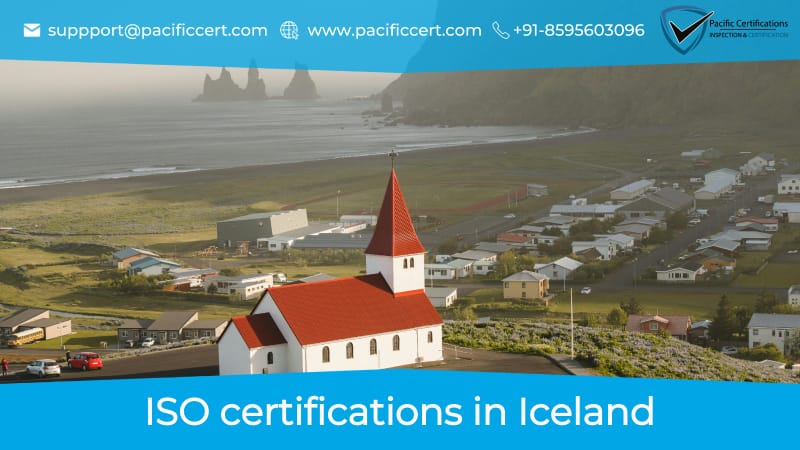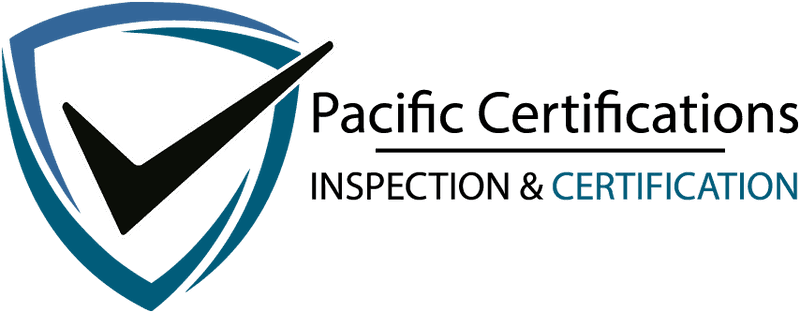ISO Certifications in Iceland, Popular Standards, Requirements and Benefits

Introduction
Iceland, known for its stunning landscapes and strong environmental ethos, is increasingly embracing ISO standards to ensure quality, safety, and sustainability across various industries. Organizations in Iceland are keen to adopt internationally recognized standards to enhance their operational efficiency and market competitiveness.
Here, we explore the key ISO standards applicable in Iceland and how we, at Pacific Certifications, can assist with the auditing and certification processes.
Key ISO Standards
ISO 9001:2015 - Quality Management Systems
Scope: This standard sets out the criteria for a quality management system and is the only standard in the ISO 9000 family that can be certified to. It helps organizations ensure they meet customer and other stakeholder needs within statutory and regulatory requirements related to a product or service.
ISO 14001:2015 - Environmental Management Systems
Scope: Provides a framework for an effective environmental management system, and it can be certified to. It maps out a framework that a company or organization can follow to set up an effective environmental management system.
ISO 45001:2018 - Occupational Health and Safety Management Systems
Scope: Specifies requirements for an occupational health and safety (OH&S) management system, and gives guidance for its use, to enable organizations to provide safe and healthy workplaces by preventing work-related injury and ill health, as well as by proactively improving its OH&S performance.
ISO 27001:2022- Information Security Management Systems
Scope: Specifies the requirements for establishing, implementing, maintaining, and continually improving an information security management system within the context of the organization’s overall business risks.
ISO 50001:2018 - Energy Management Systems
Scope: Specifies the requirements for establishing, implementing, maintaining, and improving an energy management system, with the purpose of enabling organizations to follow a systematic approach in achieving continual improvement of energy performance, including energy efficiency, energy use, and consumption.
ISO 22000:2018 - Food Safety Management Systems
Scope: Specifies requirements for a food safety management system where an organization in the food chain needs to demonstrate its ability to control food safety hazards to ensure that food is safe at the time of human consumption.
Click here to find out more applicable standards to your industry
How we can help?
At Pacific Certifications, we are dedicated to helping organizations in Iceland achieve excellence through ISO certifications. Our comprehensive services include:
Auditing Services: Our team of experienced auditors performs rigorous audits to verify compliance with the chosen ISO standard. We provide detailed audit reports highlighting areas of strength and opportunities for improvement.
Certification: Upon successful completion of the audit, we issue the ISO certification, providing you with the credentials to demonstrate your commitment to quality, safety, and sustainability.
Surveillance and Re-Certification Audits: We offer ongoing surveillance audits to ensure continued compliance with ISO standards. Our re-certification audits help maintain your certification status and promote continual improvement.
Training and Support: We provide training programs to help your team understand the requirements of ISO standards and effectively implement them within your organization.
For more information on how we can assist with your ISO certification needs in Iceland, contact us at [email protected].
Partner with us to achieve excellence and demonstrate your commitment to quality, safety, and sustainability!
Requirements of ISO Certifications in Iceland
Organizations in Iceland pursuing ISO certification must adhere to specific requirements set forth by the relevant ISO standards.
Below, we outline the general and specific requirements for key ISO certifications and how organizations can meet these standards.
General Requirements for ISO Certifications
Management Commitment: Demonstrate leadership and commitment by top management to establish, implement, and continually improve the management system.
Documented Information: Maintain necessary documentation to support the management system, including policies, procedures, work instructions, and records.
Internal Audits: Conduct regular internal audits to ensure the management system's effectiveness and compliance with the ISO standard.
Management Review: Periodically review the management system to ensure its continuing suitability, adequacy, and effectiveness.
Continual Improvement: Implement processes for continual improvement of the management system, addressing non-conformities and identifying opportunities for enhancement.
ISO 9001:2015 - Quality Management Systems Requirements
Context of the Organization
Customer Focus
Risk-Based Thinking
Process Approach
ISO 14001:2015 - Environmental Management Systems Requirements
Environmental Policy
Environmental Aspects
Compliance Obligations
Environmental Objectives
ISO 45001:2018 - Occupational Health and Safety Management Systems Requirements
Hazard Identification and Risk Assessment
Legal and Other
Requirements
OH&S Objectives and Planning
Participation and Consultation
ISO 27001:2022 - Information Security Management Systems Requirements
Information Security Policy
Risk Assessment and Treatment
Asset Management
Incident Management
ISO 50001:2018 - Energy Management Systems Requirements
Energy Policy
Energy Planning
Energy Performance Indicators (EnPIs)
Operational Control
ISO 22000:2018 - Food Safety Management Systems Requirements
Food Safety Policy
Hazard Analysis and Critical Control Points (HACCP)
Prerequisite Programs (PRPs)
Traceability System
Steps to Achieve ISO Certification in Iceland
Understanding the Standard
Gap Analysis
Implementation
Internal Audit
Management Review
Certification Audit
For more information on achieving ISO certification in Iceland, contact us at [email protected].
Partner with us to achieve excellence and demonstrate your commitment to quality, safety, and sustainability in Iceland!
Benefits of ISO Certifications in Iceland
ISO certifications offer numerous advantages to organizations in Iceland, enhancing their operational efficiency, market credibility, and overall sustainability. Adopting ISO standards can lead to significant improvements across various sectors, from manufacturing and services to energy and information technology.
Below are the key benefits of ISO certifications and how they can positively impact Icelandic businesses:
Enhanced Quality and Consistency
Improved Process Control:ISO certifications, such as ISO 9001 (Quality Management Systems), help organizations standardize their processes, leading to more consistent and predictable outcomes. This consistency enhances product and service quality, meeting or exceeding customer expectations.
Reduction in Errors and Waste: By implementing systematic processes and continuous monitoring, organizations can identify and eliminate sources of errors and waste, leading to more efficient operations and cost savings.
Increased Market Credibility and Competitive Advantage
International Recognition: ISO certifications are globally recognized, providing a mark of quality and reliability that can open doors to international markets. This is particularly beneficial for Icelandic companies looking to expand their reach beyond local markets.
Enhanced Customer Confidence: Certification demonstrates a commitment to quality, safety, and sustainability, building trust with customers and stakeholders. This can lead to increased customer loyalty and repeat business.
Improved Risk Management and Compliance
Proactive Risk Management: Standards like ISO 31000 (Risk Management) help organizations identify potential risks and implement measures to mitigate them. This proactive approach reduces the likelihood of disruptions and enhances organizational resilience.
Regulatory Compliance: ISO certifications ensure that organizations comply with relevant regulations and legal requirements. This is particularly important in industries with stringent regulatory standards, such as healthcare, food safety, and environmental management.
Environmental and Social Responsibility
Environmental Sustainability: ISO 14001 (Environmental Management Systems) enables organizations to minimize their environmental impact by improving resource efficiency and reducing waste. This aligns with Iceland's strong environmental ethos and commitment to sustainability.
Social Responsibility: Certifications like ISO 45001 (Occupational Health and Safety) promote safer working environments, reducing workplace accidents and improving employee well-being. This demonstrates a commitment to social responsibility and ethical practices.
Operational Efficiency and Continuous Improvement
Streamlined Operations: Implementing ISO standards often leads to streamlined operations, reducing redundancies and improving workflow efficiency. This can result in cost savings and faster time-to-market for products and services.
Continuous Improvement Culture: ISO standards emphasize continuous improvement, encouraging organizations to regularly review and enhance their processes. This culture of improvement drives innovation and long-term success.
Enhanced Data Security and Information Management
Information Security: ISO 27001 (Information Security Management Systems) helps organizations protect their data and manage information security risks. This is crucial in the digital age, where data breaches and cyber threats are prevalent.
Data Integrity and Confidentiality: Implementing robust information security practices ensures the integrity and confidentiality of sensitive data, fostering trust with customers and business partners.
Financial Performance and Cost Savings
Reduced Operational Costs: By improving process efficiency and reducing waste, ISO certifications can lead to significant cost savings. These savings can be reinvested into the business to drive growth and innovation.
Improved Financial Performance: Organizations with ISO certifications often experience better financial performance due to increased efficiency, customer satisfaction, and market credibility.
For more information on how ISO certifications can benefit your organization in Iceland and how we can assist you in achieving these certifications, contact us at [email protected].
Which industries need ISO Certifications in Iceland
ISO certifications are essential for various industries in Iceland to ensure quality, safety, efficiency, and sustainability. Adopting ISO standards can significantly enhance operational practices, compliance, and market competitiveness.
Here, we highlight key industries:
Tourism and Hospitality
Iceland’s booming tourism industry, driven by its stunning natural landscapes and unique cultural experiences, requires stringent quality and environmental management practices.
Fisheries and Seafood Processing
As a significant contributor to Iceland’s economy, the fisheries and seafood processing industry must adhere to high standards of quality, safety, and sustainability.
Renewable Energy and Utilities
Iceland is a global leader in renewable energy, with significant investments in geothermal and hydroelectric power. Ensuring efficient and sustainable energy production is crucial for this industry.
Healthcare and Medical Services
High standards in healthcare and medical services are vital for ensuring patient safety and quality care.
Information Technology and Data Security
The IT industry in Iceland must adhere to stringent information security and quality management practices to protect sensitive data and ensure service reliability.
Manufacturing and Industrial Production
Manufacturers in Iceland benefit from implementing quality and environmental management systems to improve operational efficiency and sustainability.
Food and Beverage Industry
Ensuring food safety and quality is paramount for the food and beverage industry in Iceland, given its role in domestic consumption and exports.
Construction and Real Estate
The construction industry in Iceland must adhere to high standards of quality, safety, and environmental management to ensure the durability and sustainability of buildings and infrastructure.
Contact us
Pacific Certifications is accredited by ABIS, in case you need support with ISO certification for your business in Iceland, please contact us at [email protected] or +91-8595603096.
Read More at: Blogs by Pacific Certifications

